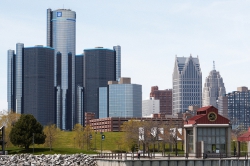Dec
3
2014

Written by Sean Thomas-Breitfeld
Many commentators have taken to calling Detroit the canary in the coal mine, as a warning to other cities facing de-industrialization, unemployment and other “urban” woes. But in this era of the city’s bankruptcy “crisis” and supposed comeback, what we see from Detroit is a warning about the cost of transferring governing power to unelected and unaccountable corporate actors.
More than a year and a half ago, Michigan’s governor essentially disbanded democracy in Detroit and imposed a corporate lawyer to oversee the city’s finances through the state’s Emergency Manager law. This law had previously been repealed by the state’s voters and has been selectively applied, putting majority-Black cities under state control and leading to a lawsuit over race discrimination. Now, the city is preparing for the mayor and city council members elected under the Emergency Manger’s reign to take back the reigns. The EM still won’t resign until the city emerges from bankruptcy in a week or two and a Detroit Financial Review Commission will maintain oversight of the agreement for 13 years. One so-called expert in the city’s bankruptcy case revealed what little regard the new class of power-players has for Detroiters and the basic value of democracy; in an interview, they talked about the risk posed to the city’s corporate recovery “once control goes back to the electorate.”
Just like the other financial crises of the last decade, the message to Detroiters has been that working-class people of color are to blame – even though research points to complex Wall Street deals. And now the same kinds of corporate interests that made money by pushing the city to the brink are looking to push long-time Detroiters out of the running in the race to cash in on the city’s recovery.
Even though business interests continually push a narrative that any kind of development will help America’s cities, Detroiters learned years ago that “business development” far too often does not develop communities. The corporate welfare, tax incentives and subsidies that big companies demand usually outstrips community benefits like increased employment. A $175 million deal with an oil refinery might have seemed like a smart way to hold on to blue-collar jobs, but only led to 15 new jobs for Detroiters, And the recent deal to commit $400 million in public subsidies to build a new stadium sparked community outrage. That’s why coalitions, organizations and activists in Detroit – our own Linda Campbell included – have been pushing for the city to pass a “CBA Ordinance” that would bring companies to the table with community to negotiate how the Detroiters will benefit from big development projects that get millions in public dollars.
The proposed ordinance is a logical, straightforward response to decades of unaccountable development where companies got windfalls in public investment without leaving any benefit to the surrounding community. Even though this grassroots campaign is not without its opponents – from both the corporate world and elected officers beholden to them – as with all David v. Goliath battles, the big guy’s arrogance could be his undoing. When opponents of CBA’s warn that “If a developer has to jump through too many hoops, they are going to go someplace where they don’t have to;” they are counting on Detroiters to be desperate enough to not ask for anything in return for taxpayer subsidies. Fortunately, Detroit is a resilient, movement city with committed activists who are not desperate, but have instead become even more savvy and strategic in response to the crises and shock doctrines of the last decade.
Photo credit: Flickr user Brian Ambrozy.
